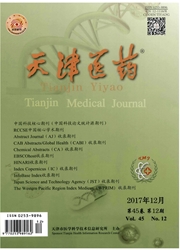

 中文摘要:
中文摘要:
目的 探讨天然产物衍生物冬凌草甲素对人肺癌细胞体外侵袭的抑制作用及其机制。方法 冬凌草甲素处理人肺癌细胞系A549和PC-9后,应用细胞增殖实验(MTS)法检测肿瘤细胞生长,Transwell试验检测肿瘤侵袭能力,黏附试验检测肿瘤黏附能力,流式细胞术检测肿瘤细胞周期,Western blotting和Realtime-PCR检测细胞周期蛋白依赖性激酶1(CDK1)、雷帕霉素靶蛋白(m TOR)、p53、p21、E-钙黏素(E-cadherin)、CD44、β-catenin、尿激酶型纤溶酶原激活物(u PA)、基质金属蛋白酶(MMP)-2/9、p-AKT和磷酸化酪氨酸激酶(p-Src)表达,报告基因技术考察核因子(NF)-κB转录活性。结果 冬凌草甲素显著抑制A549和PC-9细胞的体外增殖、黏附和侵袭,将细胞周期阻滞在G2/M期,冬凌草甲素促进E-cadherin、p53和p21的表达,下调CDK1、m TOR、CD44、β-catenin、u PA、MMP-2/9、p-AKT和p-Src表达和NF-κB转录活性。结论 冬凌草甲素可抑制人肺癌细胞系A549和PC-9的体外侵袭能力,可能与其调节酪氨酸激酶活性有关。
 英文摘要:
英文摘要:
Objective To investigate the inhibitory effects and mechanisms of a nature product derivate oridonin on invasion of human lung cancer. Methods Human lung cancer A549 and PC-9 cell lines were treated with oridonin. MTS assay was used to determine cell proliferation. Transwell assay was used to determine the cell invasion, and adhesion assay to determine the cell adhesion. Flow cytometry was used to determine cell cycle. Western blotting and realtime-PCR were used to detect expression levels of CDK1, mTOR, p53, p21, E-cadherin, CD44,β-catenin, uPA, MMP-2/9, p-AKT and p-Src. The luciferase reporter assay was used to detect the NF-κB promoter activity. Results In vitro proliferation, invasion and adhesion of A549 and PC-9 cells were significantly inhibited by oridonin. The cell cycle was halted by G2/M phase, and expressions of E-cadherin, p53 and p21 were promoted, while expressions of CDK1, mTOR, CD44,β-catenin, uPA, MMP-2/9, p-AKT and p-Src and promoter activity of NF-κB were down-regulated. Conclusion Oridonin is able to inhibit the in vitro invasion of human lung cancer A549 and PC-9 cell lines, which might be correlated with its abilities to regulate the tyrosine kinase activity.
 同期刊论文项目
同期刊论文项目
 同项目期刊论文
同项目期刊论文
 The Function of SARI in Modulating Epithelial-Mesenchymal Transition and Lung Adenocarcinoma Metasta
The Function of SARI in Modulating Epithelial-Mesenchymal Transition and Lung Adenocarcinoma Metasta 期刊信息
期刊信息
